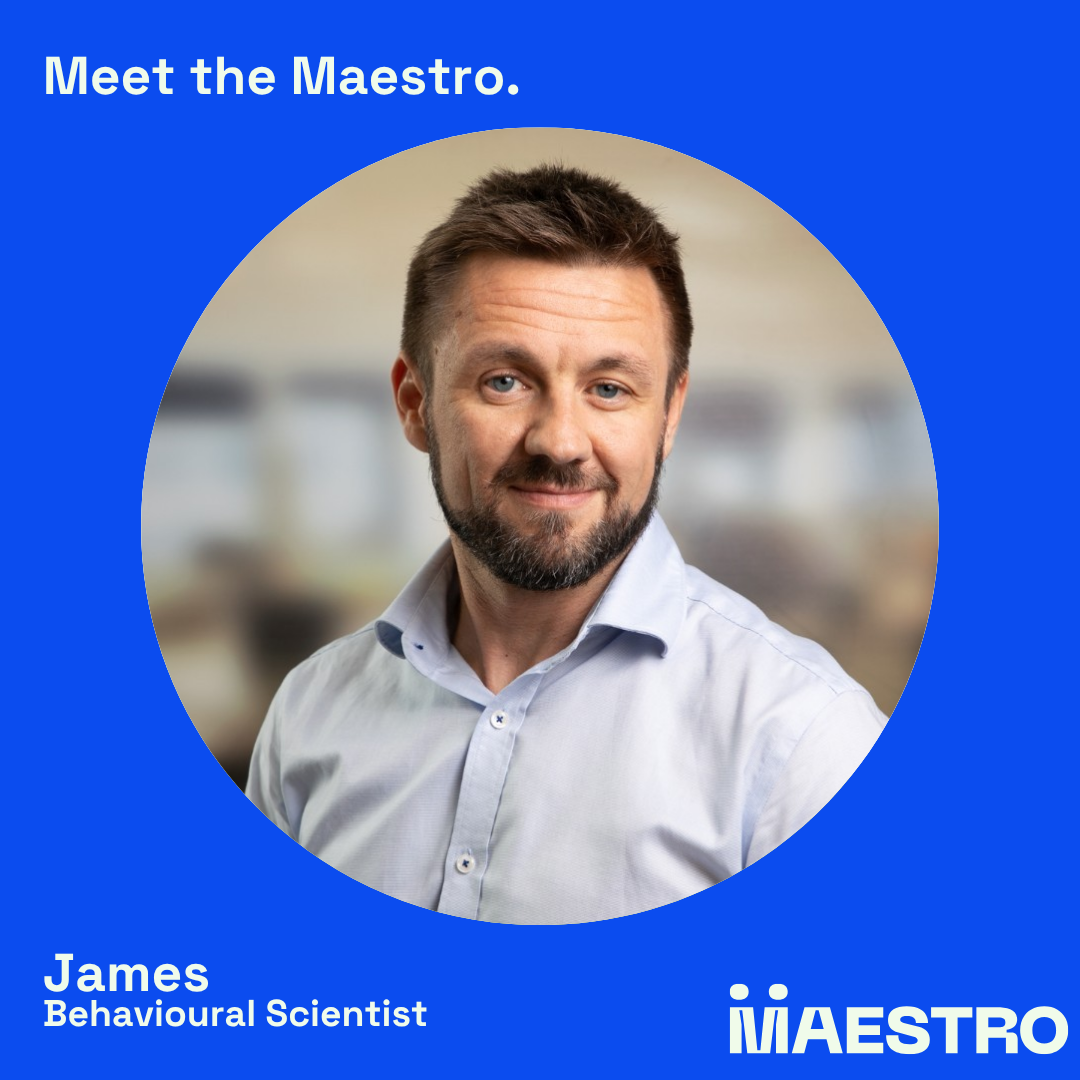
MEET THE MAESTRO INTERVIEW
James - Behavioural Scientist
At Maestro, we know there’s more to life than work. In our “Meet the Maestro” series, we peek beyond the CV to discover what makes our Maestros tick.
Our Maestro this week is James, a specialist in bridging the gap between strategy and execution through the practical application of Behavioural Science. Whether it’s increasing revenue, adopting new technology, adapting to AI, improving performance, or boosting wellbeing, James understands that success in any of these areas ultimately hinges on one thing: changing human behaviour.
Drawing on insights from Anthropology, Behavioural Economics, Neuroscience, Psychology and Sociology, James helps organisations better understand what truly drives people; and how to influence behaviour in a meaningful, sustainable way.
What sets James apart is his perspective. As a self-described outsider, he brings a unique ability to observe organisational dynamics from a fresh angle, uncovering insights that others often miss. His superpower lies in seeing what others don’t, and turning that into action that moves the needle.
1. Tell us about a career highlight to date…
Founding, building, and leading Deloitte’s global Behavioural Science practice was a privilege. I worked with amazing people in more than 40 countries across the world, supporting them to deliver real and lasting change to countless clients.
I’m also very proud of the books I’ve written, particularly the latest: “BS At Work: Why so much of modern work is bullshit and how behavioural science can make it better”.
2. Talk us through an unusual career choice you’ve made along the way…
When I was 26, about 3 years into my career, I quit a well-paid job in banking in London to go travelling and study languages. I learned Spanish in Colombia then Arabic in Damascus. Among countless life-changing experiences: 4 days in a hammock on a ferry down the Amazon, hitch-hiking around Sudan, and dancing (very badly) till dawn in Beirut, Bogota, and Cali.
When I returned to London, my old boss offered me a promotion and a pay rise to go back to the same company, so I did. I’m not sure whether leaving or going back was the unusual choice?
3. When you were little, what did you want to be when you grew up?
I wanted to be a spy, a foreign correspondent, or an explorer. Looking backwards and trying to find a common thread, I think what links all of those and what I do now is a fascination for humans and human nature.
4. What are your passions outside of work and how do you make time for them?
I love reading, mostly history, behavioural science, travel, and classic fiction. To borrow a great line from a former colleague, I’m a cricket tragic and a tragic cricketer. I also love playing soccer and following the ups and downs (mostly the latter) of my beloved Leeds United. Once my son’s a bit older I hope to get back to scuba diving.
5. If you could instantly master any skill or hobby, what would it be and why?
I love music and I’d quite like to be Bruce Springsteen, but have absolutely zero musical talent. If a genie could fix that for me please, that would be swell.
6. What’s a personal value or belief that guides the way you live your life?
As far as possible I’ve tried to do things that interest me. It’s not the most lucrative or low-stress approach to life and career, that’s for sure, but it’s led me down some fascinating paths over the years...
7. What’s a challenge you’ve overcome outside of work that shaped you?
See above. I’m cursed with the overwhelming desire to do interesting things. I don’t make things easy for myself.
8. What do you think your job will look like in 10 years time?
Here’s a hot take for you… In 10 years, the world will be more technologically advanced than ever and we’ll all be up to our eyeballs in AI. In a world of endless, instant, machine-generated slop, there’ll be a bigger premium than ever on being human. We’ll value real human connection and real, imperfect, human-created goods and services far more than we do now. The ability to understand and influence humans will be rarer and more important than it ever has been.
9. If you could travel anywhere in the world tomorrow, where would you go and what would you do?
So many places! I’ve been to more than 70 countries and when I was younger, I thought I was ticking them off a list. As I get older I realise I want to go back to most of them, while still going to new places. I’d love to get back to the far east of Indonesia to dive around West Papua again, or return to the Himalayas. New places I’d love to experience: Canada, Patagonia, or the Galapagos.
10. What does success look like to you?
Working with curious, open-minded clients who are willing to do things differently and put humans first. Earning enough money and having enough time to have fun with my family.
Related Articles
Empowering the workforce of the future.
Join the Future
Unlock Your Potential
Discover how Maestro connects you with opportunities that match your skills and aspirations.







